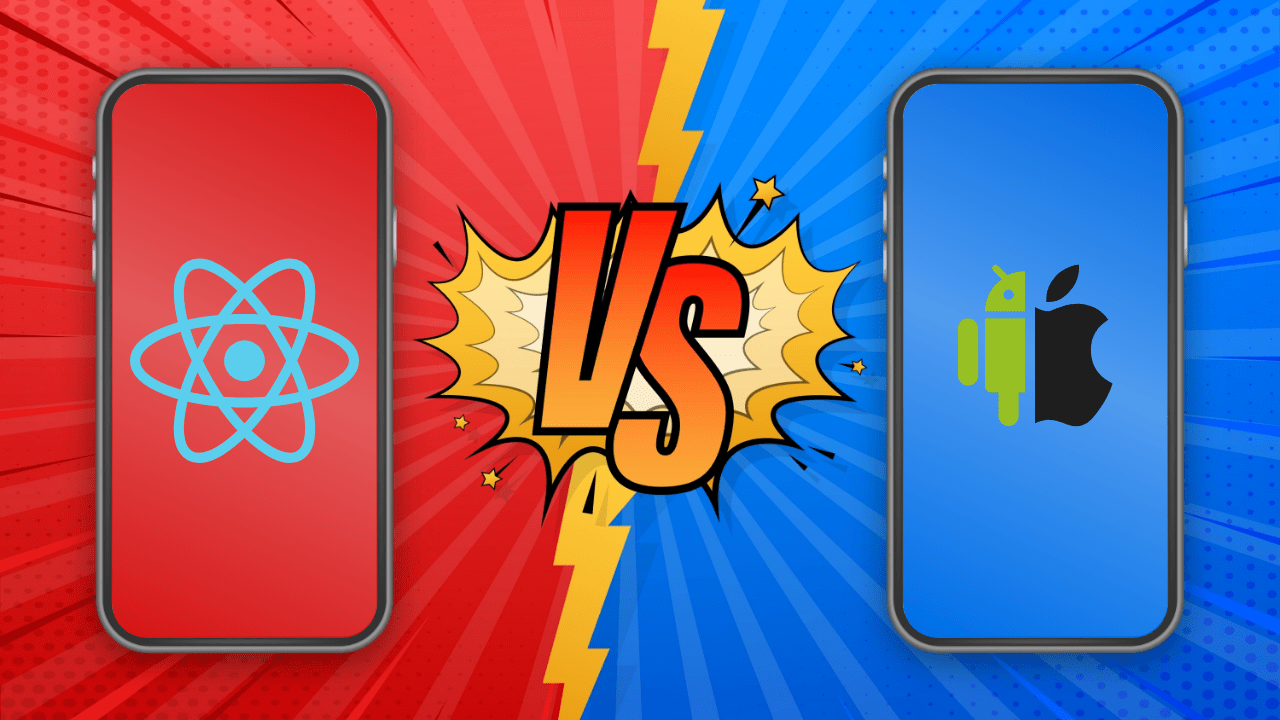
React native and native are certainly some of the key market players in the software development industry. And as a result, the battle between the two programming languages has been going on for years.
While many people choose the Native application development approach, many others have chosen to opt for the plentiful opportunities the cross-platform framework, React Native is offering.
In this article, we will compare the two technologies and will try to figure out the best viable option for you.
React Native is a framework first developed and promoted by Facebook on March 26, 2015. It is an open-source JavaScript framework, built for creating apps on numerous platforms such as iOS, Android, and also web applications. It also uses the popular web library, Reacts, and brings all its goods to software development.
A native application is a software program that is developed for use on a particular platform or device. Native apps use different languages based on the type of platform they are built on. For instance, Java is used for native Android apps, and Swift or Objective-C for native is used for iOS apps.
React Native runs on both Android as well as iOS, i.e., a single code is written for both platforms. This means that users can build React native apps for Android and iOS using the same programming codes. On the other hand, Native apps can be created only for a single platform.
As per the app development companies, React Native Apps can reduce the cost by 30-40% when compared to that Native app development. Also, Maintenance cost is lower because, in React Native, we deal with single coding. So, from per cost perspective, React Native is a good choice.
React Native supports both Hot and Live Reloading, which means developers are able to quickly see and test changes as they're made. The capability to perform these tasks without having to manually reload an app and lose its present state is a great performance improvement during development and saves a lot of time.
React Native works with JavaScript, which works only on a single thread. It cannot perform multiple tasks at the same time. On the other side, Native apps are developed using Swift and Java, which is considerably better than JavaScript to work on complex features and make heavy calculations resulting in poor performance. Thus, from a performance perspective, React Native is best.
While building a mobile application, developers frequently use different APIs which help access different platform features like camera, geo-position, and others. For this, we need Third Party Libraries that offer ready-made solutions. React Native includes a set of built-in Core Components and APIs all set to use in your App.
React Native has a wide community of developers. You can find almost every library which you want, and it is supported by NPM.
App Maintenance is time-consuming for Native App Development. This is because you will have to fix bugs at both the Native platform and resolve them one by one. But on the other hand, React Native for mobile App development is enough to resolve bugs on one platform.
Native Apps need regular updating and troubleshooting, for which elemental support is difficult and time-consuming. But, React Native Apps can do without versioning, thus making maintenance a lot simpler and more manageable.
Reusable Components are those React Components that can be used several times in your App. If a component contains any complicated logic inside it, not only does it become difficult to reuse, but it also becomes less maintainable. React Hooks are appropriate for reusable component logic.
APIs always use SSL encryption. SSL encryption protects against the required data being read in plain text between when it leaves the server and before it reaches the client. React Native has secure storage.
Android-Secure Shared Preferences - Essentially, data in Shared Preferences is not encrypted by default. Instead, the Encrypted Shared Preferences wrap the Shared Preferences class for Android and automatically encrypt keys and values.
iOS-Keychain Services - Keychain Services allows you to store certificates, tokens, passwords, and any other information that doesn't belong in Async Storage.
In the end, the question remains, who deserves the crown? Well, considering the scope for improvement and the ability to reach a larger audience, we have to give benefit of the doubt to React Native. React Native is cost-effective and runs a cross-platform. It saves our time as we don't have to write code individually for both platforms.
React Native apps such as Kockpit Mobility solutions proves the viability of the language. It is a fast, simple, and secure solution that provides meaningful insights with data visualization and seamless dashboards.
Discover the most interesting topic